
Prescribing Information and adverse events reporting information can be found at the bottom of this page.
This website has been developed and funded by A. Menarini Farmaceutica Internazionale SRL. The Improving Diabetes Steering Committee is supported by A. Menarini Farmaceutica Internazionale SRL. The SGLT2 Inhibitor Prescribing Decision Tool has been independently prepared by the IDSC. The media partners for this activity are GPnotebook and Diabetes on the net. GPnotebook and Diabetes on the net have had no input into the content of this website.

Bridging the gap between type 2 diabetes guidelines and prescribing practices
SGLT2 Inhibitor
Prescribing Decision Tool
Use our evidence-led, interactive SGLT2 Inhibitor Prescribing Decision Tool for a quick reference guide that supports you in making appropriate prescribing decisions in clinical practice.
The handy traffic light system provides clarity regarding common areas of confusion, including the early and late use of SGLT2 inhibitors and complication risk.
Click here to use the SGLT2 Inhibitor Prescribing Decision Tool
Click here to download the wallchart
Click here to request a printed wallchart from Menarini
The SGLT2 Inhibitor Prescribing Decision Tool has been independently prepared by the IDSC. A. Menarini Farmaceutica Internazionale SRL has fully funded the development of the SGLT2 Inhibitor Prescribing Decision Tool wallchart.
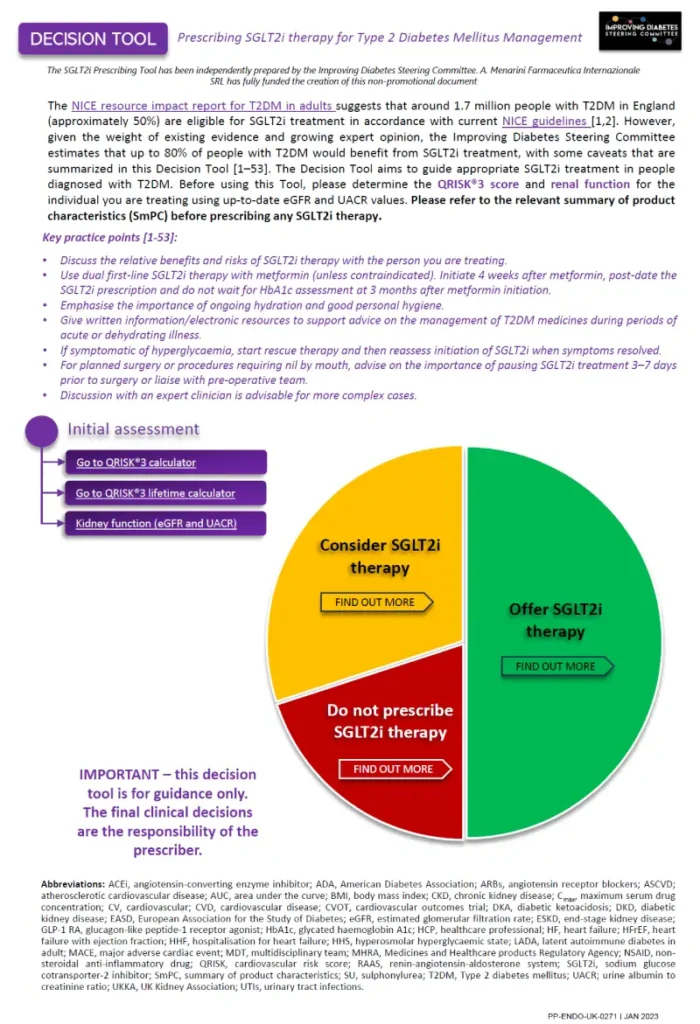
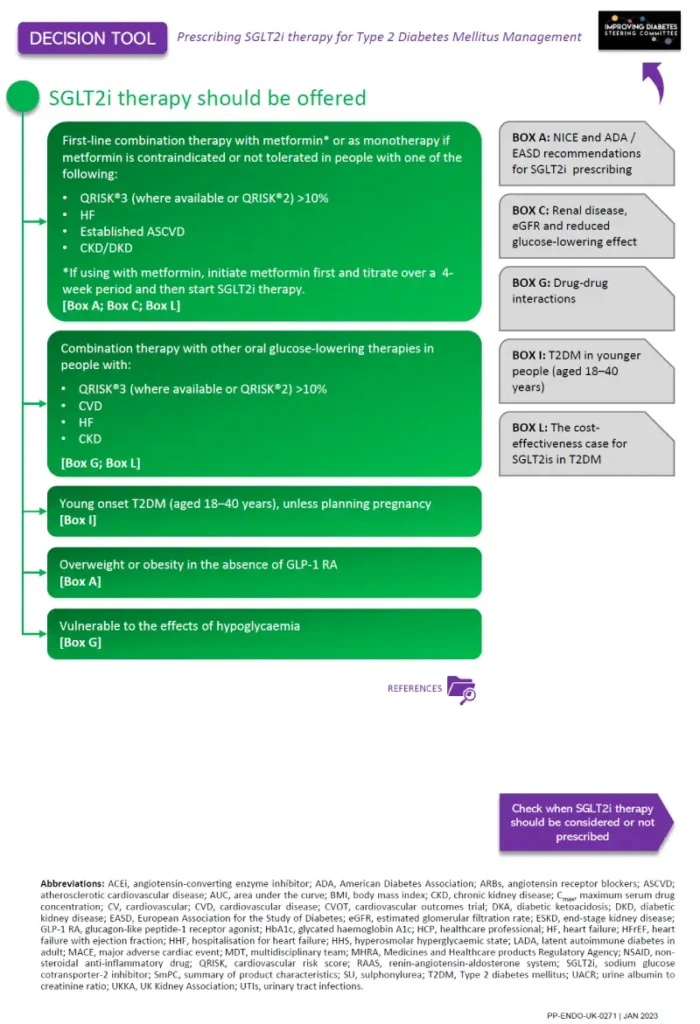
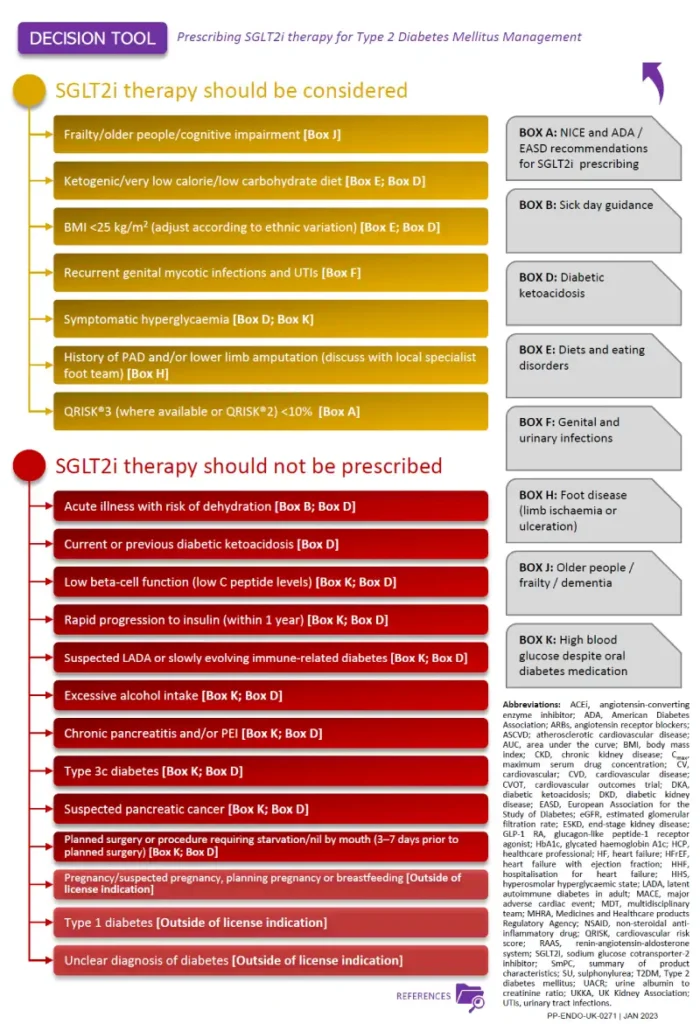
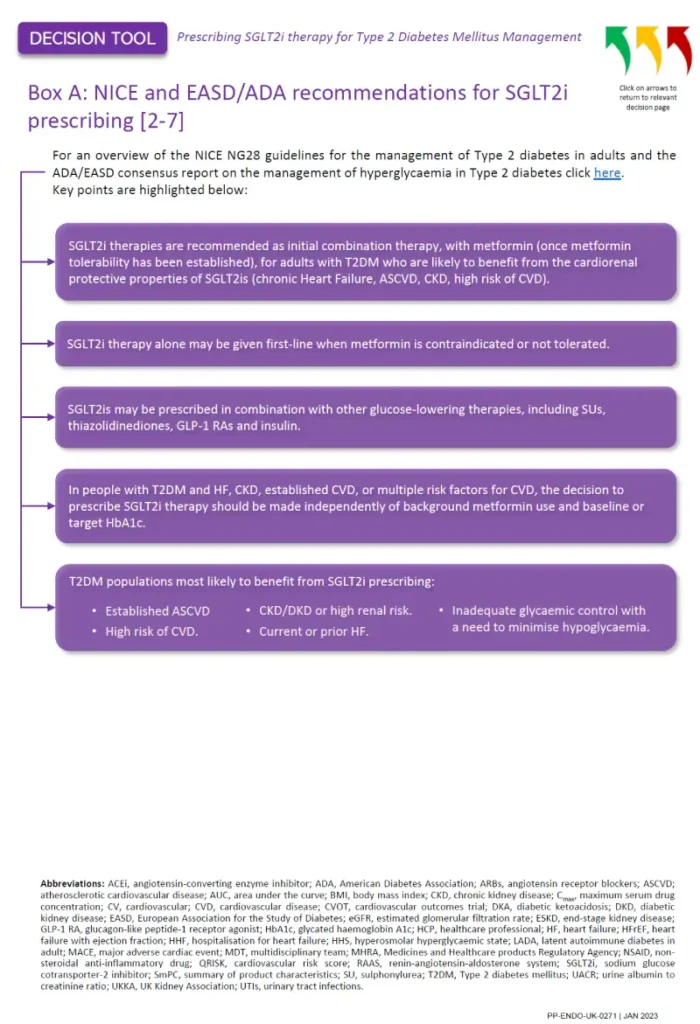
SGLT2 inhibitors:
Clinical case studies
Do you know how to optimally treat a young patient with type 2 diabetes who has an increased risk of developing cardiovascular and/or renal disease, but their HbA1c is normal?
Are you confident in managing comorbid patients who deal with type 2 diabetes and chronic kidney disease or diabetic polyneuropathy?
The IDSC have put together a list of detailed case studies which you might come across in your practice. Access these below to increase your confidence in managing your patients.
Click here to put the evidence & guidelines into practice
The clinical case studies are fictitious and are for guidance only.




SGLT2 inhibitors: the new standard of care for cardiovascular, renal and metabolic protection in type 2 diabetes – a new narrative review
The IDSC has published five narrative reviews1–5 that reflect the growing evidence surrounding SGLT2 inhibitors in type 2 diabetes and aim to translate these evidence into clinical practice.
The most recent narrative review5 summarises the value of SGLT2 inhibitors in treating cardiovascular, renal and metabolic diseases, and places the relative risks into context.
Click here to read the full review
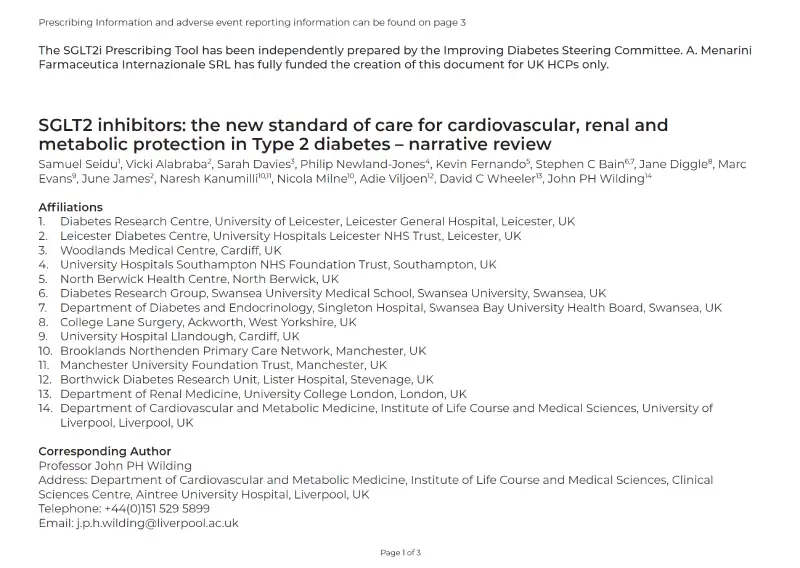
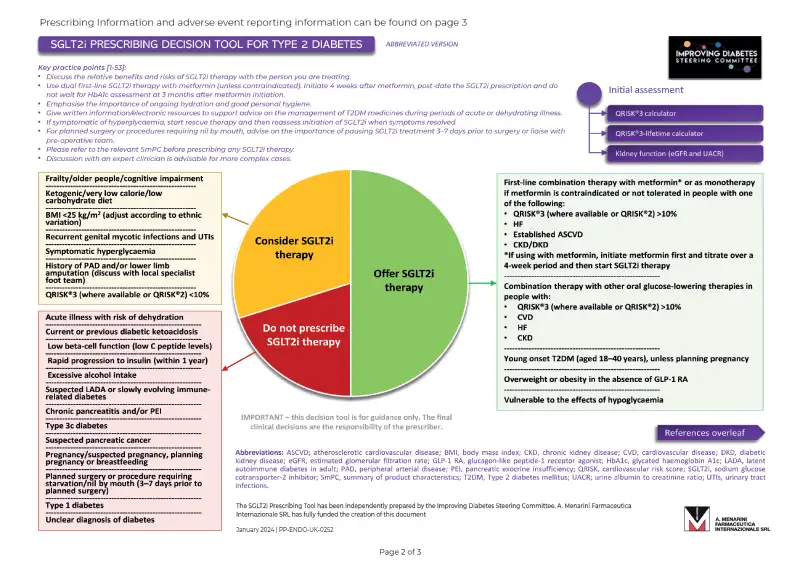
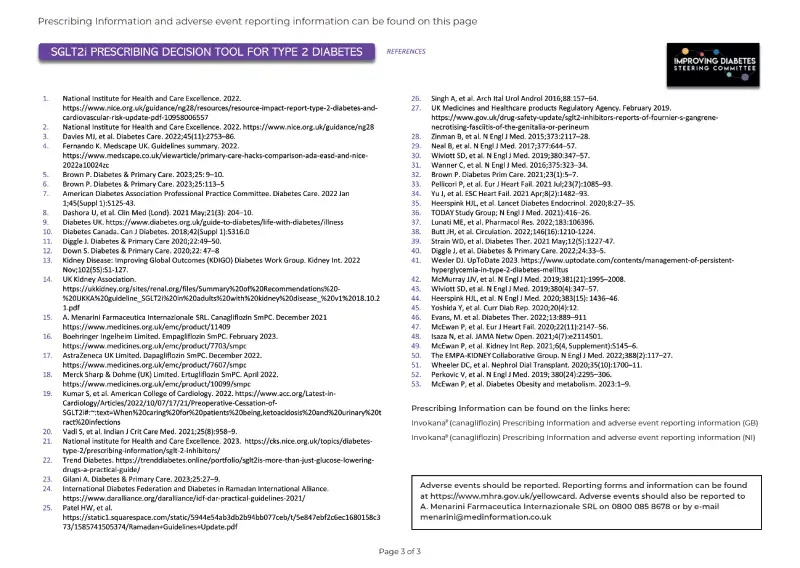
SGLT2 inhibitors: the new standard of care for CVRM protection in type 2 diabetes – a new narrative review
The IDSC has published five narrative reviews1–5 that reflect the growing evidence surrounding SGLT2 inhibitors in type 2 diabetes and aim to translate this evidence into clinical practice.
The most recent narrative review5 summarises the value of SGLT2 inhibitors in treating CVRM diseases, and places the relative risks into context.
Click here to read the full review
The above link will direct you to a third-party website. A. Menarini Farmaceutica Internazionale SRL and the media partners have had no input into the content of this website.
CVRM: cardiovascular, renal and metabolic; IDSC: Improving Diabetes Steering Committee; SGLT2: sodium-glucose co-transporter-2
Hear from the IDSC
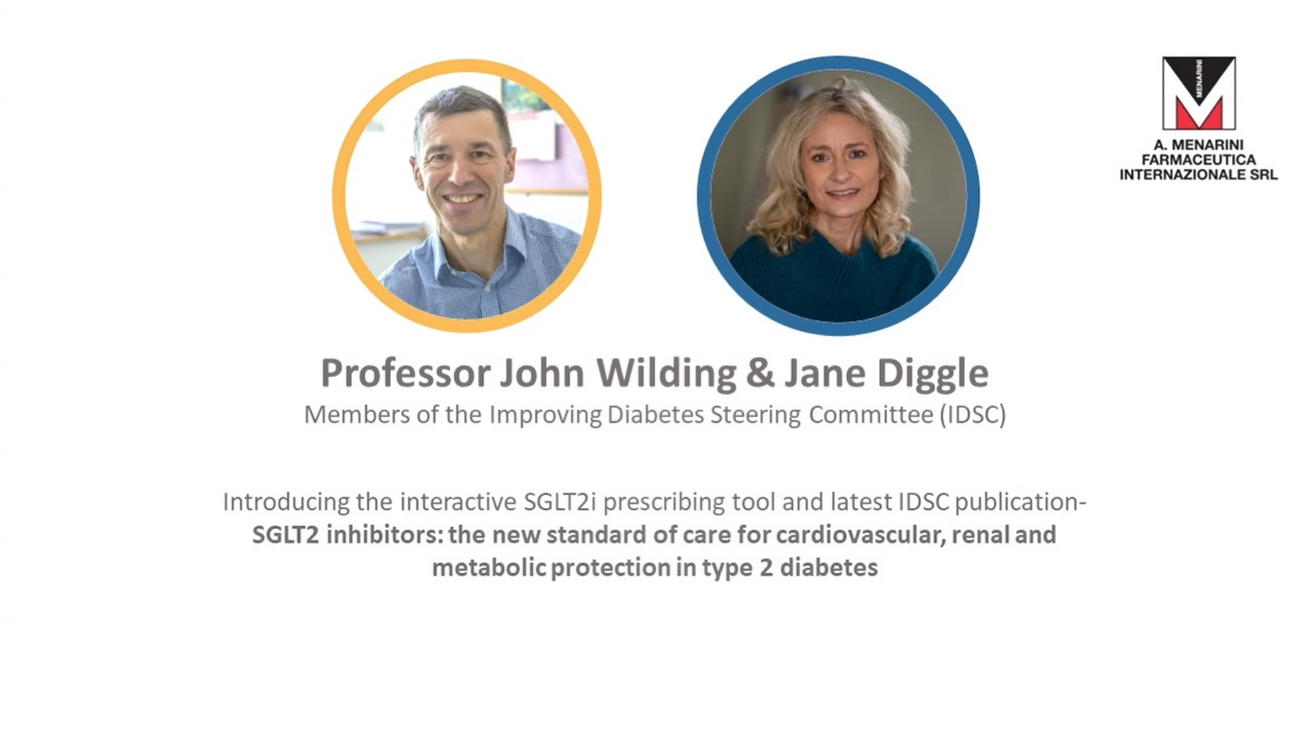
Introducing the SGLT2 Inhibitor Prescribing Decision Tool and how to use it in clinical practice
Professor John Wilding
Chair of the Improving Diabetes Steering Committee; Professor of Medicine, University of Liverpool
Jane Diggle
Specialist Diabetes Nurse Practitioner, College Lane Surgery, West Yorkshire
Find out more
Watch Professor David Wheeler and Jane Diggle walk through the practicalities of the SGLT2 Inhibitor Prescribing Decision Tool for type 2 diabetes management and how you can access the IDSC resources.

What are the outputs of the IDSC and how do they benefit people living with type 2 diabetes?
Professor John Wilding
Chair of the Improving Diabetes Steering Committee; Professor of Medicine, University of Liverpool
Find out more
Join Lisa Kelly as she interviews Professor John Wilding on his role in the IDSC, their previous and most recent outputs, and how the materials they produce aim to benefit both healthcare professionals and people living with type 2 diabetes.

How can IDSC initiatives benefit both patients and healthcare providers in primary and secondary care?
Phillip Newland-Jones
Consultant Pharmacist in Diabetes and Endocrinology, University Hospitals Southampton NHS Foundation Trust
Find out more
Watch Lisa Kelly and Phillip Newland-Jones discuss the importance of concomitant treatment in diabetes and other cardiorenal metabolic diseases, and how the tools developed by the IDSC can help both healthcare professionals and patients with type 2 diabetes.

Nephrology and type 2 diabetes: Insights from an IDSC nephrologist
Professor David Wheeler
Professor of Kidney Medicine at UCL & Consultant Nephrologist, The Royal Free, University College London
Find out more
Hear Lisa Kelly and Professor David Wheeler discuss the latest guideline-based narrative review by the IDSC, and the link between diabetes and kidney disease.

Exploring the latest IDSC narrative review on SGLT2 inhibitors and their role in CVRM conditions
Dr Kevin Fernando
GP Partner with Special Interest in Diabetes, North Berwick
Find out more
Watch Dr Kevin Fernando talk about the impact the IDSC has had over the past six years – from five narrative reviews to evidence- and guideline-based prescribing decision tools.
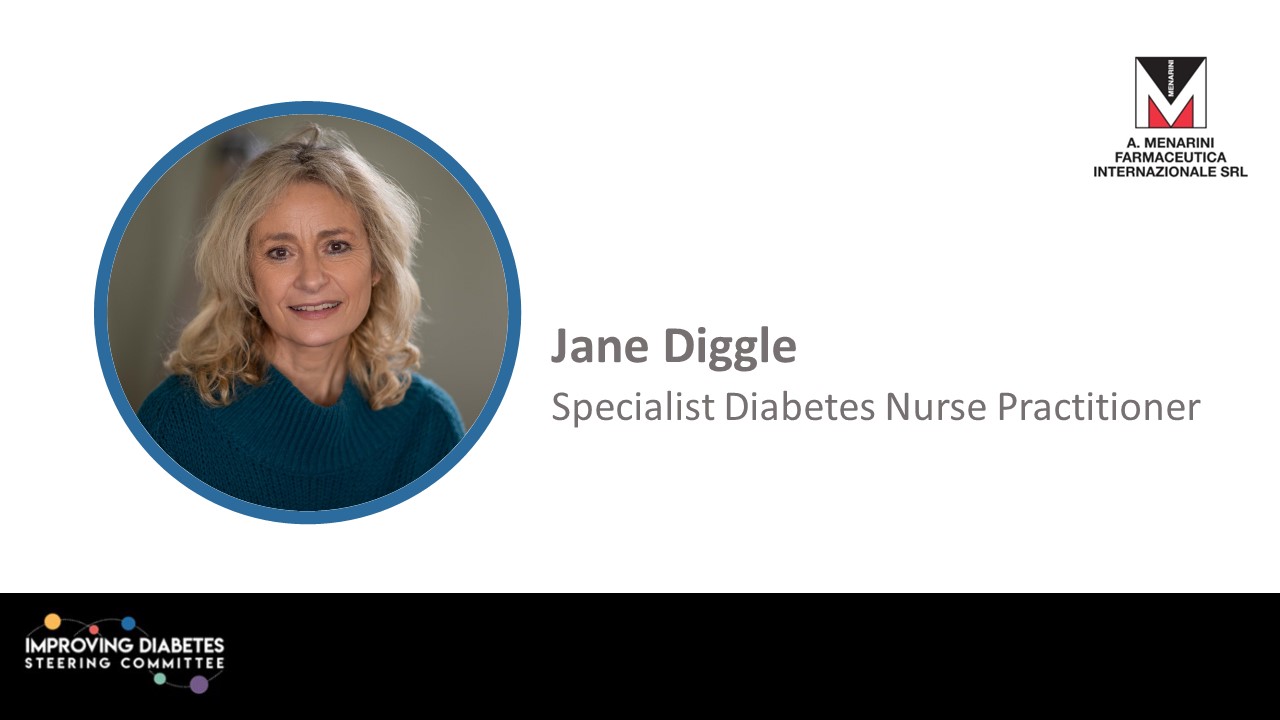
Bringing expertise together: How did the IDSC interdisciplinary team collaborate to create practical tools for type 2 diabetes?
Jane Diggle
Specialist Diabetes Nurse Practitioner, College Lane Surgery, West Yorkshire
Find out more
Jane Diggle discusses her involvement with the IDSC, and the outputs and impact this interdisciplinary expert group has had in the diabetes landscape.
If you are watching or listening to these videos, please ensure the content cannot be viewed or overheard by the general public
Meet the IDSC
John PH Wilding (IDSC CHAIR)
Department of Cardiovascular and Metabolic Medicine, Institute of Life Course and Medical Sciences, University of Liverpool, UK
Jane Diggle
College Lane Surgery, Ackworth, West Yorkshire, UK
Amar Ali
Oakenhurst Medical Practice, Blackburn, UK
Samuel Seidu
Diabetes Research Centre, University of Leicester, Leicester General Hospital, UK
Marc Evans
University Hospital Llandough, Cardiff, UK
Debbie Hicks
Trend Diabetes, UK
Vicki Alabraba
Leicester Diabetes Centre, University Hospitals Leicester NHS Trust, Leicester, UK
Naresh Kanumilli
Brooklands Northenden Primary Care Network, Manchester; Manchester University Foundation Trust, UK
Dipesh Patel
University College London, London, UK
Sarah Davies
Woodlands Medical Centre, Cardiff, UK
Nicola Milne
Brooklands Northenden Primary Care Network, Manchester, UK
Jose Luis Górriz
University Hospital Clinic, University of Valencia, Spain
Philip Newland-Jones
University Hospitals Southampton NHS Foundation Trust, UK
Adie Viljoen
Borthwick Diabetes Research Unit, Lister Hospital, Stevenage, UK
Ana Cebrián
University Hospital Clinic, University of Valencia, SpainSpanish Diabetes Association, Catholic University of Murcia, Service Murciano de Salud, Cartagena, Murcia; Centro de Salud Casco Antiguo Cartagena, Murcia; Primary Care Research Group, Biomedical Research Institute of Murcia (IMIB), Spain
Kevin Fernando
North Berwick Health Centre, North Berwick, UK
David C Wheeler
Professor of Kidney Medicine at UCL & Consultant Nephrologist, The Royal Free, University College London, UK
Stefano Del Prato
University of Pisa, Pisa, Italy
Stephen C Bain
Diabetes Research Group, Swansea University Medical School, Swansea University; Department of Diabetes and Endocrinology, Singleton Hospital, Swansea Bay University Health Board, UK
Partha Kar
Portsmouth Hospitals NHS Trust, UK
Andra Da Porto
Department of Cardiovascular and Metabolic Medicine, Institute of Life Course and Medical Sciences, University of Liverpool, UK
CVRM: cardiovascular, renal and metabolic; IDSC: Improving Diabetes Steering Committee; SGLT2: sodium-glucose co-transporter-2
References
- Wilding J, et al. Diabetes Ther. 2018; 9:1757–1773
- Ali A, et al. Diabetes Ther. 2019; 10:1595–1622
- Wheeler DC, et al. Diabetes Ther. 2020; 11:2757–2774
- Wilding JPH, et al. Diabetes Ther. 2022; 13:847–872
- Seidu S, et al. Diabetes Ther. 2024; 15:1099–1124
Invokana® (canagliflozin) is indicated for the treatment of adults with insufficiently controlled type 2 diabetes mellitus as an adjunct to diet and exercise:
- As monotherapy when metformin is considered inappropriate due to intolerance or contraindications
- In addition to other medicinal products for the treatment of diabetes
For study results with respect to combination of therapies, effects on glycaemic control, cardiovascular and renal events, and the populations studied, please refer to section 4.4, 4.5 and 5.1 of the Invokana SmPC.
Click here for Invokana® (canagliflozin) United Kingdom Prescribing Information.
This website has been developed and funded by A. Menarini Farmaceutica Internazionale SRL. The Improving Diabetes Steering Committee is supported by A. Menarini Farmaceutica Internazionale SRL. The SGLT2 Inhibitor Prescribing Decision Tool has been independently prepared by the IDSC. The media partners for this activity are GPnotebook and Diabetes on the net. GPnotebook and Diabetes on the net have had no input into the content of this website.
Adverse events should be reported. Reporting forms and information can be found at https://yellowcard.mhra.gov.uk/. Adverse events should also be reported to A. Menarini Farmaceutica Internazionale SRL on 0800 085 8678 or by e-mail: [email protected]

PP-IN-UK-1449 v2 | November 2025

A. Menarini Farmaceutica Internazionale SRL have had no input into the contents of the footer and are not affiliated with the links. GPnotebook is responsible for the contents of the footer.

